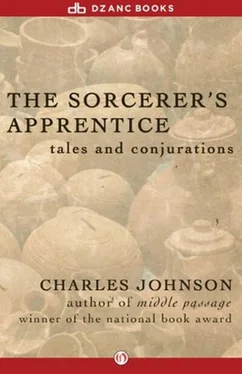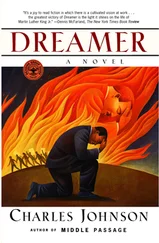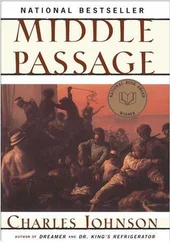Well, no point in B-movie melodrama.
The Creature was hideous beyond belief, but there’s no reason to bang the harpsichord about it. To any man who saw him, it would seem he was a huge boiled crayfish about the size of a fence post, sprinkled with a little squid, lobster, and jumbo shrimp — what you might expect to find on a seafood platter in a decent restaurant, or on the pages of Planet Stories . Whenever he moved, he left a trail of paste or organic matter. I stayed a respectful distance from this vision, who (I learned later) had six claws, eighty-four teeth, three antennae, two stomachs like a cow, and four enormous tentacles — his, he told me, later, was a family for large tentacles, which I believed. What else could I say? I knew nothing of his standards for beauty and truth, or even if he had such standards. And what did his control room contain? Spectrometers, I guess. Particle detectors. The only furnishings were four-feet-high platforms on the floor. In their bases lights were recessed. A wall-to-wall Tele-cipher — a sort of electronic speculum, with a screen thin as hair and integrated circuitry — processed data from Carbondale, Benton, Herrin, and Elk-ville. It could multiply, divide, add, do square and cubic roots, Boolean equations, calculate in metalanguage, or the Hilbert-Ackermann system, or deploy Rs 1logical strategies, and I couldn’t for the life of me guess its full capabilities. Even so, a physician knows an unhealthy being when he sees one. Entering the room, putting away my knife, I could tell the pilot wasn’t exactly running on all twelve cylinders. He gave a Dostoyevskian sigh. He looked sick as mud. What convinced me of his sensitivity, however, was that he had a Cambridge manner, and the pallor any creature has when he is trying to ask directions in German.
“No — speak English.” I placed my bag on a platform by the Telecipher. “Speak English. You have landed in America. Are you injured?” I felt, rather than heard, the Creature say, “Quite.” Telegnosis. What English he knew, as it turned out, came from eavesdropping on radio broadcasts around Cambridge and Amherst College — he pronounced car as “cah” and water came out as “waddah,” which diminished his strangeness by a little. When introductions were over and he had taken my coat and politely offered me a part of the floor to eat (the whole saucer was edible, a fifty-four-thousand-ton Hershey bar), he touched the outside of my elbows as he talked, taking both my hands in his tentacles, and confessed in a very apologetic voice, “I don’t want you to get the wrong idea. I’m not a Big Noise on my world, Henry. I am what you call a carrier. I have been quarantined.”
“Quarantined, you say?” I withdrew my pipe and charged it. “You’re not an ambassador or a diplomat?”
“No, I’m afraid not. On my world I’m the equivalent of your street people — I’m not even sure how this ship works. I’m sorry.”
“Then why were you sent here?”
“They can’t cure me,” he said. “They use Earth as a leper colony.”
This was all very unsatisfying. All these centuries we’d hoped for higher technology, wisdom. And what tumbled down from space? Outpatients . I sighed, tamping my pipe down with my thumb. “You want our medical opinion?”
“Now you understand. On my world the sickness is called by various names, but none as accurate as ‘the Plague.’ What I mean to say, Dr. Popper, Henry — may I call you Henry? — is that I have been exiled until either this disease passes or your culture discovers a remedy. Your research in this area skyrocketed in Vienna in 1884, Gottingen in 1916, then at Duquesne, Stony Brook, and Northwestern ten years ago. Don’t be alarmed. It’s not contagious. The Plague is not a disorder of your world, to my knowledge. It can’t be passed physically, or picked up by sitting on toilet seats at the Trailways station.”
“Of course.” I smiled, just faintly, frightened, and took another step back. I couldn’t shake the urge to spread tartar sauce on him. “Can you tell me the symptoms?”
“Well,” he said, touching the tips of his tentacles, looking away, “for no apparent reason, and without the slightest warning, I experience feelings of first a tightness in the cerebral area, a tremor or unpleasant quiver, then a shock of dislocation, cold sweat, followed by vomiting, vertigo — the sense of falling, the inability to ascertain precisely what things mean, and the peculiar sense that I am somehow dependent upon everything in my perceptual field: xlanthia, hbeds , or sploks , which have a curious opacity, a marvelous beauty”—here he burst into tears—“yet threaten to absorb me, engulf me, annihilate me completely, because I am, in a word, deeply and inexorably different from them.” His anguish exploded in my mind. “It’s nauseating, do you see?”
“Steady there.” I reached to pat his shoulder or knee — it was hard to tell which. “You don’t have to go on.” The effort to explain had greatly excited him — he was smoking. He stared, blankly, like a shock victim. Gambling, I gave him Trional. “Just tell me how to get out and I’ll bring help—”
“So,” he said, cutting me off, five tentacles slithering over what might have been a wet forehead, “so I feel a horrified fascination for the sploks and so desire (and yet dread) them that I yearn for their recognition, shift from melancholy to euphoria, and think of nothing else, which”—his voice quavered—“has led other Plague victims to irascibility, violence, moodiness, a morbid fascination with Time, boredom, the loss of memory, and, worst of all, thermogenesis.”
“Beg pardon?” I asked. “Thermogenesis?”
“It’s what you call internal combustion. The Plague affects us that way, physically. The final stage is extinction. We explode.”
“When you say explode, do you mean explode?”
“Like Chinese fireworks,” he said. “Like an MTV music-video.”
“Horrible!” I swallowed. Then: “Did I come in through that corridor or—”
“You haven’t heard the worst.” His voice was frail. “I can thermogenerate at any moment.”
I gave the Creature a dose of diphenylhydantoin.
It’s not every day a Negro doctor is delivered a new medical anomaly with, as it were, a red ribbon around it. It was, accordingly, as you see, an awful affliction. Awful! He now stood only as high as my chest. The room was full of smoke. Psychosomatic, I’d have to say, and how it might be cured was more than I could have told you, but a man who has survived Carbondale for thirty years is an eternal optimist. We had but to isolate the cause of the Plague to name it, but name it to know its nature. The Nobel Prize would be a gift to whoever diagnosed, then cured this uncanny disease. It was front-page stuff. Medical history, I hoped, might even rename it after me. Realizing I would need help for a real examination, I fumbled into my coat, and hurried to the Telecipher for my bag. It was then that, looking up, I saw — or thought I saw — a man with a crowbar crack the lock to a farmhouse full of cats, enter, which startled an old woman inside, then smash her head like a melon. Was this Anna? As he tore at her dress, there was a break in the film, some markings, then I saw another woman, younger, and quietly eagle-rocking her hips under a boy on a high bed with a carved oak headboard. She wore a pink slip like the one I had bought last year at Penney’s for Mildred. Peering at the screen, I saw…
“That’s my wife!” I croaked. “Can you turn this thing up?”
The Creature increased the volume. “Would you like the odors, too? This device, as far as I understand it…”
Читать дальше












